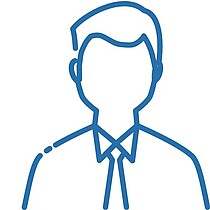

Article: Tuesday, 8 December 2015
After the 2008 global banking crisis, people in society, academia and in management started to reconsider what it meant to be a moral leader. One of the key questions in this discussion was whether or not ethical behaviour could really be enforced by law and regulations, or should it be left to each person to decide what is ethically correct in that particular situation? In his PhD research Kyrill Goosseff, from Rotterdam School of Management, Erasmus University (RSM) argues that morality is not a skill that can be learned. It is as deeply embedded as the emotions. But, he says, business leaders can learn to identify their intrinsic morality and act on it. He will defend his PhD thesis on 10 December.
In his research Goosseff states that most leaders base ethical decisions on institutional and religious moral traditions. That still leaves their morality open to interpretation. A moral compass with the authority to convince people should be based on how people actually experience morality in their daily lives. To experience morality requires an impartiality that most people can’t normally attain, he found, so Goosseff developed an interview technique he calls the Veil of Innocence method to help people reach that mental state of impartiality.
In the study Goosseff describes how a person’s ego speaks in three voices – as a realist, a critic and a creative – that work together like an internal management board. In the interviews participants are asked to ‘offer a contract’ to all three parts of their ego, while temporarily ignoring all the advice and judgments that they would normally offer. Reaching this unfamiliar impartial state allows interviewees to discover an innate and subconscious moral structure. This moral structure is what defines human beings as moral beings, Goosseff states.
In the final step of the interview, participants are brought back to the normal state of the natural ego, and are asked to report their conclusions. Goosseff says using this technique enables participants to discover that becoming a more moral leader requires faithfulness to an innate moral structure. After the interviews, Goosseff’s subjects also described what they thought it would take for a true CEO to become a moral leader: respecting the individual rights of clients, the environment and society.
Goosseff concludes that the impartial and universal morality he describes can only be meaningful when it becomes part of the personal choices leaders make. So how should morality become part of leaders’ day-to-day decisions?
There are prompts and reminders that can help, says Goosseff. In response to the financial crisis, the financial industry developed codes of conduct that ask leaders to uphold basic human values. One example is the well-known ‘MBA oath’. Goosseff’s research results indicate that written out codes of conduct like these can help leaders to express themselves as the moral beings they innately are. In future, events like the big banking crisis – when managerial morality faltered – could be avoided if leaders learn to overcome their egos and stay true to themselves. Ultimately, morality cannot be imposed by codes of conduct; leaders must grow it from within, Goosseff concludes.
Former Professor of Cross-cultural Management

Kyrill Goosseff has defended his dissertation in the Senate Hall at Erasmus University Rotterdam on Thursday, 10 December 2015, at 13:30. His supervisor is Prof. S. J. Magala. Other members of the Doctoral Committee are Prof. Pursey. Heugens (RSM), Prof E. Bonet Guinó (ESADE), and Prof J. F. D. B. Wempe (Saxion), Prof. H. Willmott (Cardiff), Prof. M. Yolles (Academia), Prof. W. A. Dolfsma (University of Groningen) and Dr A.A. Downs.


Science Communication and Media Officer

Corporate Communications & PR Manager
Rotterdam School of Management, Erasmus University (RSM) is one of Europe’s top-ranked business schools. RSM provides ground-breaking research and education furthering excellence in all aspects of management and is based in the international port city of Rotterdam – a vital nexus of business, logistics and trade. RSM’s primary focus is on developing business leaders with international careers who can become a force for positive change by carrying their innovative mindset into a sustainable future. Our first-class range of bachelor, master, MBA, PhD and executive programmes encourage them to become to become critical, creative, caring and collaborative thinkers and doers.
